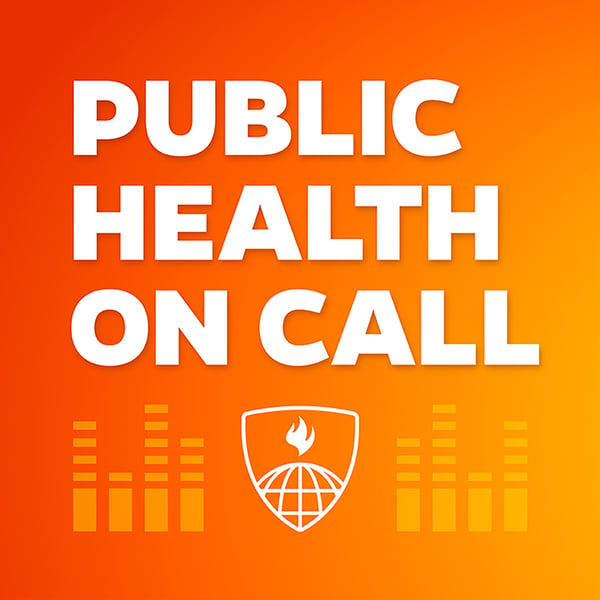927 - World Breastfeeding Week: Creating Sustainable Support Systems
Public Health On Call
The Johns Hopkins Bloomberg School of Public Health
4.8 • 620 Ratings
🗓️ 1 August 2025
⏱️ 19 minutes
🧾️ Download transcript
Summary
About this episode:
Breastfeeding plays a crucial role in babies’ development and new research is even suggesting that breast milk can provide benefits to the microbiomes and immune systems of adults. In this episode: Meghan Azad, a breastfeeding researcher from the University of Manitoba, explains the chemical compounds that make human breast milk unique from other mammals, the opportunities to build more community support for breastfeeding, and the benefits of lactation for mothers.
Guest:
Meghan Azad, PhD, is a professor of pediatrics and child health at the University of Manitoba, where she leads a lab studying breastfeeding and breast milk.
Host:
Lindsay Smith Rogers, MA, is the producer of the Public Health On Call podcast, an editor for Expert Insights, and the director of content strategy for the Johns Hopkins Bloomberg School of Public Health.
Show links and related content:
-
World Breastfeeding Week—World Health Organization
-
New study reveals breastfeeding duration influences infant microbiome and respiratory development—UM Today
-
Breast milk’s benefits are not limited to babies—The Economist
Transcript information:
Looking for episode transcripts? Open our podcast on the Apple Podcasts app (desktop or mobile) or the Spotify mobile app to access an auto-generated transcript of any episode. Closed captioning is also available for every episode on our YouTube channel.
Contact us:
Have a question about something you heard? Looking for a transcript? Want to suggest a topic or guest? Contact us via email or visit our website.
Follow us:
-
Here's our RSS feed
Note: These podcasts are a conversation between the participants, and do not represent the position of Johns Hopkins University.
Transcript
Click on a timestamp to play from that location
| 0:00.0 | Welcome to Public Health On Call, a podcast from the Johns Hopkins Bloomberg School of Public Health, |
| 0:05.9 | where we bring evidence, experience, and perspective to make sense of today's leading health challenges. |
| 0:16.3 | If you have questions or ideas for us, please send an email to public health question at jh.h.u. |
| 0:22.6 | That's public health question at jh.u.edu for future podcast episodes. |
| 0:29.6 | Hey listeners, it's Lindsay Smith Rogers. |
| 0:32.6 | Today, breastfeeding. |
| 0:34.6 | For World Breastfeeding Week, Megan Azad, who leads the Manitoba Interdisciplinary Lactation Center in Canada, |
| 0:41.9 | joins me to talk about all things breast milk and breastfeeding, from what makes human milk so unique to the barriers and challenges of breastfeeding here in the U.S. and around the world. |
| 0:53.1 | Let's listen. |
| 0:55.8 | Megan Azad, thank you so much for coming to us on public health on call. How are you? My pleasure. Thanks for having me. I'm great. |
| 1:00.8 | Good. Could you tell us a little bit about you and your work? Yeah. So I'm a professor at the University of |
| 1:05.8 | Manitoba in Canada in the Department of Pediatrics and Child Health. And I'm also a research |
| 1:10.0 | scientist at the Children's Hospital Research Institute of Manitoba, |
| 1:12.6 | and my lab studies very broadly breastfeeding and breast milk. |
| 1:16.6 | And so I come to this area as a biochemist, so I'm really interested in all the different components in the breast milk. |
| 1:21.6 | But I have since then also trained in epidemiology, so we have an interest in the public health aspects and implications |
| 1:27.7 | of breastfeeding and also in understanding how we best support families to breastfeed. |
| 1:32.1 | And you came to us and you said, by the way, world breastfeeding week is coming up. I think |
| 1:37.6 | this could be an interesting topic. Tell us about world breastfeeding week. Exactly. So every year, |
| 1:42.0 | the first week of August is celebrated around the world as world breastfeeding Week. They have a theme every year. This one is creating sustainable support system. So really looking at how we support breastfeeding. But it's a reason and excuse to talk about breastfeeding, to celebrate it around the world and to really spread awareness about the importance of breastfeeding and the many different aspects of it. I think it's really interesting that you're coming into this with like a biochemistry |
| 2:04.5 | lens. Can you tell us like what makes human milk unique? Yeah. So my interest in breastfeeding came from |
| 2:11.0 | my prior research on the microbiome. So that's all the bacteria and microbes that live in and on our |
... |
Transcript will be available on the free plan in 2 days. Upgrade to see the full transcript now.
Disclaimer: The podcast and artwork embedded on this page are from The Johns Hopkins Bloomberg School of Public Health, and are the property of its owner and not affiliated with or endorsed by Tapesearch.
Generated transcripts are the property of The Johns Hopkins Bloomberg School of Public Health and are distributed freely under the Fair Use doctrine. Transcripts generated by Tapesearch are not guaranteed to be accurate.
Copyright © Tapesearch 2025.

